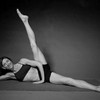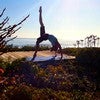Read Full Transcript
So, yeah, welcome to vines anytime. Cynthia, thank you for having me. Grand Master teacher over Manas Pilati is, I want to ask you all about what exactly that means, but that's a good question. [inaudible] we'll go again. Um, there's so much I want to know. Um, but I'm just gonna start with the basics for people who don't know you. And, um, but I will fill in just to say that you're one of four people including Romana. I understand that has been given, has been given this title of Grand Master Teacher, um, level one instructor, I believe. Um, bottom line is it's, it's an honor that you're here. Um, not that many people get to ask these questions. So I feel a huge responsibility. Um, and what I just want to invite you to do is to share anything you'd like because I think the few people who have access or have had access to Romana um, well there are so few people at, uh, at your level. So whatever you can do to share your history, um, her, anything about her and about you that I don't delve into, please, um, try and shed some light for us because we want to know, um, backing way up. Can you tell me how did you even get involved in Flonase? Ah, my dance teacher when I was really young, Barbara Wall, Zack, I was, um, young dancer and growing up in Manhattan and she was determined, she used to be a soloist for the city ballet.
So she was determined to get her students contracts with companies that, that she herself had worked with and that she loved. And um, one of the things that she used or, or wanted us to use to help improve our skills to achieve those goals was politics. So she, so she was impressed. She introduced, no, she didn't practice it maybe at some stage, but she knew about Ramona because she was closely linked with city ballet. Her son was there. She had worked with bounce Shane in the early years when it was a school. And, um, her daughter in law was one of balance sheets, muses. So, so everybody knew about Romana and that's how, you know, she's to inspire and push her students to go to Ramana to help improve their skills and improve their chances at getting a contract with a dance company.
So one of the things that um, you've danced for a very long time, right? I read on your website that you started I think when you were four. Okay. But there's also a quote on your website that says, I'm, I dance from the age of four. But it was when I started philosophies that I felt I really started to dance for the first time. My first question is, when did you start [inaudible] in relationship to age four and well I was 16 or 16. So how is it that after 12 years of disciplined and formal dance training, is it that you feel like you just started to dance for the first time?
Well, cause it gave me, um, you know, how it promotes pay performance skills where it was true. It gave me a lot of strength. It gave me a lot of freedom and more endurance. I just felt like, I know this sounds so silly, but I felt like I could fly because I had so much, you know, prior to that, there's a lot of pressure growing up a dancer and then when you decide to take it seriously, you know, you work really hard and you go through this, this stage of puberty and you, you there all this competition and all this stuff that goes on that you really grow into and you're unaware of, particularly when you start really young. And for me, I took a lot of it for granted because I did start really young. So even though it's a natural thing for you, because it's something that you've done all your life, you don't necessarily always develop properly, your body starts to change. And there are a lot of restrictions that, that occur as a result of that. And so then doing plays, I fixed all those things.
Everything just cleared up and I was able to get my legs higher and have more endurance, feel stronger and more empowered. So it gave me more confidence. I wondered if you were going to say control. Well. Um, no, actually it gave me more freedom. So the sense of control that you learned doing it actually gave me more freedom in the downs before that I felt more controlled or restricted. Hmm. I think that's public.
I'm not a dancer and I think that's probably true in other, for me [inaudible] the same thing. Once you practice them enough, you start to feel free. Yeah, yeah, that's right. You have to practice enough to get to that point to feel the freedom. But you know, practicing with Romana kind of gets you to that point quickly. I hated it by the way. That was my next question. Do you love it right away?
No, no, no. I hated it. It was hard work and it was extra work, you know? And as a teenager it's like I wanted to go out and hang out, you know, on the corner with, with, actually we didn't hang out on the corner. We used to have these, um, these basement clubs in Manhattan that, that we would all hang out at. And of course, I wasn't a part of that because I was doing all this extra work. But, um, it didn't take long for me to realize that that was important and that, I mean it was going to change my life and didn't take me long to, to love it along. Yeah. Yeah. It was discipline. It was more discipline. It was more work, you know. That's difficult. You started your work with the [inaudible] New York City Ballet, is that correct? Okay. And then went on to dance with George Balanchine or, um, helped me, well, George Balanchine was director of New York City ballet and choreographer, so, and it was in city valley that I worked with other choreographers, um, like predominantly Balanchine and Jerome Robbins. And then, um, different people that came in for projects that, that were, you know, we would have these festivals and within those festivals sometimes people would come in and, and choreograph or they would collaborate. Like Twyla thought did a collaboration with, um, Jerome Brahms handle was the pace.
And so got a chance to experience working with her. And, uh, the year I left, I was started to work with lar Lubovitch who was a European choreographer at the time. He was working in Europe. And, um, just different people. I remember doing glass paces. This was a really nice experience doing uh, glass pieces. Philip Glass music drone went through a period of really loving Phillip glass and we had him in the studio with us. Um, working through the pieces we were as Jerome was developing it. And so, and then he conducted the first couple of nights. So things like that were really, yeah, they were pretty special at the time.
You just kind of go, yeah, got to go to work again. But when you look back at it and you really, um, think about the experience and also the way that I live my life and what I give to my work in place has a lot to do with the experiences I had. Hmm. Well that's the large drama. Um, that's part of why I like to do these interviews is because I often will ask a distinguished instructor, won't you let me just ask you questions and they think, well, what am I going to say, my bio? And yeah, inevitably and already you give a little piece of, you know, to look is compacting for you as you've let you know. It's amazing. So again, thank you. But, um, there's a lot in, in your own ministry and that's without even getting to Romana, you know, so thank you. Um, with, well first I want to know, do you have a favorite choreographer that you work that you'll say, okay, I thought that was pretty, yeah, that was pretty amazing. I that the one of the, I mean, I came into the piece late in his, so I got to work in the company from the end of 78 through to, um, 87, 86, 87 and so, and he died in 83. So for those few years I got to work with him, which was great. And a couple of years before that as a s a student at the School of American ballet. But, um, hey did, one of the ballets that I was a part of was, um, beloved ballet called blood that he did for Merrill Ashley. And it was just an amazing experience. You know, he'd walk in bottle of wine, set it on the piano, you know, we'd all be sitting there waiting. He'd come in, have our skirts, everybody would dress up really nice when Balanchine was coming and perfume hair up. And then he would just have the, the penis play a few bars of music. And then he would just think for a minute, get to the middle of the room, just move his legs around and then the music would play.
And then you would just repeat what he did. And he would form the dancers. And within, by the end of the day, there was a piece. And then, you know, then years later, you know, they consider it a masterpiece. But the process was so quick and natural and you know, and I guess that's why I gravitated to Ramana because she has that same quality, you know, she's really intuitive and natural. Perfectionist. Yeah. So, um, just can you tell us more about Ramana? I mean, I, for one, when, when was the last time you saw her? Um, around this time last year at the, we had a conference in Florida and she was there. And what can you tell us? I've never met her or even been in the room with her.
So I'm counting on you until, okay. You can say shade. Well, that's that you just said the right word because the thing that, that most, um, inspires me about Ramana was her spirit. You know, you can learn steps, you can learn, um, material from anybody, but if, if you're not inspired, then it only goes so far or, you know, particularly the type of person I was because I was physical all my life. You know, it really took somebody to inspire me, for me to be really committed to anything. Um, and she was that person. She just, she just had a wonderful spirit and she was, uh, she's a perfectionist, but the way that she goes about attaining that or, or bringing that out in people is natural. She has a really natural ability of bringing that out in people. She, she somehow, she's just one of those spirits that make you do things that you just don't think you're capable of. So, and that was the same that I recognize in Balanchine. It's like he saw or knew he saw potential in you that you didn't recognize in yourself and had a magical way of bringing that out.
I guess I'm wanting to know what the magical way was. Not that you can probably, it's probably so intense humor, humor, humor, um, intuition, insight, just, Oh, well those are the things that, but, um, and I think just, uh, I think humor is the, the, the, the most significant thing, you know, just not taking yourself so seriously and, and really, uh, pushing people to do things that, you know, being in a position to just, you know, like bend over. Well, go on. Can't do it. But, you know, I dunno. I Dunno what makes people special in that light. They just don't, it wasn't necessarily what she would say to you. What do you do? Well, she, well, the thing that she says, well, she was very encouraging. I think, you know, everybody had their own experiences, but to me I thought she was really encouraging.
I think that you would think that she wasn't paying attention to you and then you know, you with, for instances I was doing my apprenticeship. I would come in and hide in the corner and just go through my notes and do a little workout and I would stay at the same place, you know, repeating the same thing day in and day out. And you think that you're safe because she's so busy, you know, there's, she's not noticing what you are and aren't doing. And then a few days later she'll just walk past and say one thing that, okay, just start. Yeah. Yeah. It goes to the heart of what you needed. So yeah, she was paying attention. She used to pay attention to everything. She's very compassionate person. And, and the other thing that was great is that she kept, it was like she was the matriarch, cause you know when you're in New York, whether there was two people in the studio or 20 at the end of a long day, she would just invite everybody out.
And so you would work really hard all day and then you would go to her place and she would play wonderful music and, and open wine and order food for everybody. And then you would have a really wonderful spirited time doing something completely different. Enjoying life. So she wasn't all, no, not at all. Not well. Yes, but no. Yes. But now, you know, it was all about enjoying your life and part of enjoying your life was feeling strong and fit and healthy and, and capable. Yeah. And then, and then enjoying it. That was the same thing with balancing. That was the same attitude. You know, we would go to Europe and we'd all be in company class waiting for him to come in to get started. And He'd come in and dismiss a soul and go, you're in Paris.
Go and drink wine, come back at five, you know? Yeah. And so you bring that spirit, you bring that experience back to what it is you're passionate about. Mm hmm. [inaudible] we take things a little too seriously talking about that. Yeah, I agree. I agree. So, yeah. Well, let me come back to that because I want to get more of your history first, but, um, I'm not exactly sure of the timeline, but you were, it sounds like you were working with Ramona sort of throughout your dance career, at least in New York. Yeah. Okay. So about how long was that time period? Um, I'm from 76. About 10 years.
Okay. So I'm curious if you would attribute or what you would attribute, what influence did [inaudible] have on your dance career? Is that something you can specify it? Um, it made me a better dancer. I'll tell you what it did. And that was both good and bad is that I never, you know, in the early, in the first year that I was with the company, I sustained an injury which was also caused by Polaris because in a strange kind of way, I was having this experience where I felt so strong and so uplifted and so lighten and capable and I was gloating a little bit and I was sit in a rehearsal for stars and stripes. And I remember just feeling that that's what I was saying before, like I was flying and instead of being, um, focused on what I was doing and this kind of in the mirror, you know, monitoring myself in my, my new found capabilities and I sprained my ankle quite severely. Now what helped the same thing that that indirectly caused the injury also helped me because I was back on stage in three months.
I severed all three ligaments. So I had to, I was in surgery that evening, had my, my ankle sona got it put in a cast. And within three months I was back on stage doing concerto Barocco symphony and C and another ballet, which I don't know if if, I mean people listening may not know those valleys but in Concerto Barocco alone, the dancers on stage for 19 minutes, which doesn't sound like a long time, but you're dancing the whole time and at the very end you're doing these hops some point moving forward and backwards and sideways and carrying on. So that was thanks to Pele's because I was able to maintain my lessons, keep the work going, keep my strength. And then when the cast came off I was able to, you know, I did some physical therapy as well, but I was able to really develop my strength and, and my alignment in a way that got me back and got me back quickly. And then I never sustained an injury again.
I mean I had hip problems cause I have a shallow hip socket. But even that, you know, at my age I don't have any problems with it. I have all my real joints still intact. But how long did you dance? I danced, I danced until I was about, when did I start? Until I was 34. So I danced for 30 years and then I've been doing this now for it with a small break. I've been doing this for, oh, oops. I shouldn't say probably about 33 years.
That's great. So yeah. How has it changed for you, glottis? How has [inaudible] changed for you in 33 years? Or has it hasn't, it hasn't, it hasn't the thing, the only thing that's, that's changed, well, it's not changed. It's just keeps developing, just keeps getting big better in all those years. You know, I'm still uncovering, um, my understanding of it, there's still things that are being uncovered through the work. There's still things that remind I used to do and say that I'm only just now understanding. She didn't take, you know, she didn't spend a lot of time standing over you and explaining or over-correcting and she said very, very little, very little when she taught, you know, and she didn't hover and she didn't, you know, force you to do things. She, she would just guide you. She had a way of guiding you and, um, because she didn't say a whole lot the things that she said, I'm really, I, I've understood, but I'm starting to understand them more through my own experience. So, so they're, they're having a whole new life again.
And that's wonderful. You know, Monica Wilson say the same thing about Romanos specifically. And I know I feel that way just traveling through the melodies experience too. But, um, it's interesting that you both say something so similar about Ramana that there's not, you know, you're, you understand it one way and then same exercise or the same process becomes something completely different. And you hear what she said again. Yeah. Well, what I feel I learned from her was not, I mean, I've learned to exercises from her and, and, and other people around, but what I learned from her was a certain, um, way to live life that was the most valuable. And that would, that I was conscious of from the very first day. Not, not when I was a child, but when I went back to train, you know, when I used to sit and observe, I never really remembered the exercises that she was teaching people or why, but it was just her and the way she lived her life that I really learned. Interesting. Yeah. And that was really, that was special. That was very inspiring.
And I think she imparted a bit of that into everybody that, that worked with her. You know, she gave a little bit of that to everybody, which is invaluable. Hmm. Yeah. Okay. You know about that. It's really nice. Cause the thing that I noticed too is that, you know, you use the terms grandmaster and all of that, that that doesn't really have any, I mean in light of what I'm saying now you say that that really doesn't have much significance. Well tell me cause that, that I don't think it does. I mean they're just terms. I think that for me, you know, I travel around, yes, I have a responsibility and I feel that responsibility. Um, I feel that responsibility in regards to maintaining the work itself, maintaining the choreography, so to speak. But, um, you know, we go to these conferences and I listened to other of my colleagues teach and we're all teaching the same thing. We're all saying the same thing. And it has, I mean, the work is there, you know, you point your foot, you point your foot, but, but what we're teaching is in essence, what we're teaching is, is an understanding of something.
And that's what Ramana gave us. You know, that, that kind of joy to be, and, and yet you're a grand master teacher along with, yeah. Well, I don't know how that happens really. It's nice to have. It's not a process that you, you didn't go through any checklist, was it, you know, was there a wand way of what, how did that happen? Oh, I don't know. I guess, you know, I mean, I'm, I'm an intelligent person. I guess the people in the community in, in that community felt that, that for whatever reason, they felt comfortable or they felt like, you know, they got, they, they felt inspiration from, from learning from certain people. And maybe it's, it's a collective of people that, that supported the idea. I don't know. Personally, I, I just terms like that because for me, I learned my perspective is that I'm always learning myself.
I'm learning from all the people that I may, I learned from all of my clients. I constantly learn from the things I remember Romana saying. I learned from, you know, the books I read and the stories I'm told about Joe. And so, you know, I feel on par with everybody else. Like I'm, because I'm learning from them and, and fortunately they're learning from me. It's kind of a really nice shared experience. And, and I just try my best to, to keep my, my heart open and my ears open and provide people with some fun and inspiration. And, and just in regards to too, the responsibility, try to keep the work clean and precise. Um, just to clarify for people who don't know it, I think it goes level three, level two and level one. That's in terms of teacher trainers. Yeah. Okay.
Did you go through that process? No, I don't want you were just, you know, um, so, um, uh, if you're embodied and I've asked around a little bit that you embody what Eden Romana or maybe just certainly from the work, the little bit of work I got to do with you today is you embody what I think the audience is and, or maybe it should be, but is so I wonder is, was that the criteria? And I guess you don't know, but no, don't, so do I come to you and say no. Are you granted? No, no, no, no, no. Some, somehow you got the title. I'm just curious. Like how did, did someone tell you no, I think that that, again, I think, I think it's just the community. I think that, you know, uh, if you have, uh, a community of people and, and people feel safe or not safe, but they feel inspired by, by whatever it is that you're bringing to the table, you know, and how your, you're helping to maintain the education that they feel they want, then then they speak out about that. And maybe that's, that's what leads to that position. I'm also, I also feel that it's about trust. I, whatever I've done in life, I've always had a lot of integrity in what I've done. And so I guess there's a lot of trust behind that type of integrity.
Okay. I think I understand. Yeah. You know, it's so many people, well maybe it's just me when I hear that, I want to know what that means. Not for any other reason than it's obviously special. And I think I have my own answer cause I can see it. I just want to know what was it. But I see it's the community that's, yeah, it's the community and, and it's having a, a certain, uh, sense of integrity and, and commitment, loyalty, trust, all those things. Yeah. And for me, those things are pretty innate. It's not something, a criteria that I aspire to or anything. It just is part of who I am. Yeah. I feel a sense of responsibility more and more. Um, and again, it seems to be a natural process. It's not something that, um, uh, [inaudible] is just, it's not a burden. It's something that's being laid on me or anything.
But I just feel a sense of responsibility because I think that, you know, Ramana spent a lifetime trying to maintain and an impart with, with her goodwill and knowledge on so many people. And you know, there's Ramana's plots and this is quite extraordinary. I mean, little did Joe realize how big this thing would become? You know, there's a studio that, that we've been developing in Maricia [inaudible], which is in the middle of the Indian Ocean, well not in the middle, but over, near, near Madagascar. And, and in India, you know, I have a student now in India and it's just, I think it's just amazing that it's spread out that far. But you know, I feel the responsibility, not just in the work but also in trying to keep the community together and trying to, to maintain the tradition so to speak and integrity and also, um, develop, you know, bring it forward because life keeps changing. Times keep changing. People are changing and, and that's the only way I think that you can keep a community together, you know, because it starts to become fragmented and I feel a responsibility in that, but not, not alone. Again, like I said by, by, you know, trying to inspire everybody. And then in doing that I feel a sense of responsibility in really opening up, um, conversation like we're having now to really allow people to know that there is Romanos plus that there is this woman, Ramana who spent her whole life working so hard with her daughter Sherry, to really, um, preserve and, and spread the good work of, of Joseph [inaudible] and, um, that I think is really important.
And I feel like that is not just my responsibility, but the responsibility of that community to work together to make that happen. It's a delicate thing because it's really hard to promote something that is very traditional and, and um, what's the word? Yeah. By Fam. Yeah. That are like a family and it's, it's a very delicate balance and I think that, that it's an important one. It's important. And so, you know, I have to turn it back at you and say thank you for this opportunity because I think that it's important for people to know about [inaudible] as they do or think they, but to really, um, understand what it truly is about and how valuable it is and what the history of this man is and why, you know, who Romana is in light of that and who we all are in light of that and how such a good thing is really spreading and, and to support it and not to sort of shred it apart. And, you know, it would be a shame to see it slowly dissolve. So in that sense, I feel a great sense of responsibility.
Can you speak traditional versus, I don't want to say traditional versus non. Um, it, it, that gets delicate too. Um, but there's no need for that to really be that delicate. I think, you know, I mean, I mean we see things like that in all facets of life. You know, why should it be so delicate in this, you know, there, there are people, there are purists and there are people who, who are inspired by an aspect of that period and then take it in the direction that they want to take it in. You know, I mean the, the beauty is how many people it's inspired and, and you know, people simply need to, to really read, learn and, and make those decisions for themselves. You know, and everybody is different. Everybody, you know, I happened to, to be that type of person. I'm, you know, I was ballerina all my life, so I'm, I'm a bit of a purist and so that's the road that I chose to go down. And fortunately I, in in that choice, I got to meet some very special people. Ramana being one of them, you know, so lucky me. But you know, if you meet rail, who's, who's, that was it for me. That's it. Yeah.
What I now believe is a misconception, but I'd love your opinion. Um, I think that some people that are not trained by Ramana or are purists think that that community [inaudible] would never legitimize what they're doing. MMM. MMM. You have this or nothing. And so when I speak to her and when I read on your website, you, again, there's a quote, I won't go to it, but it basically said, um, what you said a moment ago, which is that Ramana is a purist and some of the first generation teachers like Romana chose to add in other things. Um, research anatomy, different, different things.
Yeah. Which are, which are all good things, you know. I mean, I think those are all good things. I don't think there's anything wrong with that. You know, I, I, the only thing that, that for me, if I decided to go down a different road and, and develop something, which, which, who knows, that may happen. I don't know what, where my life is going to lead at this stage. I could only know where I'm at at the moment. Um, then I hope that I have the courage to call it Cynthia, is this, that or the other thing inspired by, you know, or if, if if you wanna find out more about what Cynthia has done, then then you would find out where it was inspired. Okay.
Right. Yeah. Um, and that's, that's, that's my perspective on things and it's neither here nor there. It's just the way that I look at it. And it's also not, not, um, perceived in a negative way. You know, I think that, um, what people are doing is great. I think that it's great developing knowledge through the anatomy and all of that stuff. The thing that, the reason that I don't Fincher them down that road is because, um, by sticking to the work that I've been given, I've found all of that in it because I've not, um, needed to go here, there and everywhere. I've actually found an understanding of the anatomy. I've understood that through the work I've, I've found all those different facets within the work, the body of work that I've been given. So for me, I don't need to go down any road. Now, this is after 33 years and this is after teaching for 17.
So I'm satisfied. But other people, you know, may not be, other people may, may, may feel the need to, to keep educating themselves and to keep learning different things. And as a result of developing things, which again, I perceive that as, as developing, developing something. So, and there's nothing wrong with that, but that's, that's where I think you get into, people get into this, you know, these lines, these divisions, and they're not really, they're not really division. You know, if we were in a perfect world, that community I talk about would be the entire community. But, but they're not, because they're not really divisions. They're just extensions of their variations of, well, not even variations up. They're extensions of yes. In, in a sense, you know, and, and for me, the, the, the source of all those extensions is all the only place I need to be. Well said. What do you think makes a good [inaudible] instructor?
What are the intangibles or, um, what do you do? What do you think? Um, somebody knowing the work, knowing the work and exercises, I think I'm somebody who keeps the work in their body. So doing it. Absolutely. I think, uh, somebody who has patients, Mike's a good teacher and humor. Somebody who doesn't take themselves too seriously and uh, someone who has a lot of common sense. Do you find those things are teachable?
Hmm. Well, decree. Um, th th yeah, there, there are ways sometimes you can get, you know, I mean that, that's how I tried to inspire people by sort of taking it. Sometimes. Sometimes I'm fortunate to be in a circumstance within a teaching situation where a circumstance comes up that I can take it there and make a point that helps people understand that or help somebody not take themselves too seriously. I assume that's a good day. Uh, I hope so.
Not always the, I hope I don't always leave by X. Um, I do sometimes a lot less now. I, you know, um, for years I missed it. The work ethics in Australia are a little bit different. Um, they're not bad. They're just different. Uh, you know, New York is kind of a crazy place and it's a world of all of its own. And, uh, but, and then I, you know, for a long time I missed dance. I got over that.
But, uh, now I realize as I've gotten older I realized that I don't miss that, that really my home is, is really me. It's where it's within myself. It's so wherever I am, I feel comfortable. And I guess that makes it a lot easier for me to travel like this as well. Hmm. So, no.
Do you ever entertain the idea of going back if I made a lot of money, I, I don't think I can go back and, and struggle in New York. It would be really difficult to have to lift living in a environment like Australia. That's why I love coming to California cause it's sort of like a mid, a balance between the two worlds. But I would definitely come more often. I don't know if I could live here cause all I think about is the big one.
But yeah, I don't think about it on a day to day basis. But, um, yeah. I don't know. I don't know. You know, I have two kids who are grown up now. One's moving to New York, the other one fantasizes about it, but so dunno. Who Do you work out with when or who would you love to work with if you could, if you had time? Uh, where or where n anywhere in the world. Anyone, anyone. Anyone that wants to have me or anyone, anyone. People tend not to. I'd love to work out again with Ramona. That's what I would love. Um, but truly anybody, it's just really nice to have eyes on you to have a pair of eyes on you, you know? Um, not a whole lot of people like to work me out, but really there. Yeah. Okay.
Hmm. Set up the report. Yeah, I think it's important. It's so different doing your own workout to having someone watch you, especially a, an x performer, you know, that's everything busy. They know.
I do. I, yeah. Last one. Can you today? No, I know exactly what you're talking about. The first one in mill and yet I work out regularly and it was very different experience and well, you know, I almost cried. I will cut that. Um, okay. Just a couple more. Um, first what did, what advice do you have for people just starting holidays? Anywhere in the world that'd be with Romana or even cherry or [inaudible]. Just, just starting. Just, just journal. They're just clients or just people come in and they just want to May. Um, what would you do?
Be patient. Take your time. Enjoy yourself. Hmm. What after over 30 years of teaching or doing felonies keeps you interested? All of you. All the people that I meet, the, the students, the clients that the work itself, everything about it. How does it fuel you and how does it do anything, but what? Well, what fuels me, you know, seeing people look better and feel better.
Seeing people get inspired, seeing people change their lives and develop a sense of, of, of discipline and desire to be better in themselves. That keeps me going. Hm. To you, what is [inaudible]? Holidays is a way of keeping me strong, happy, and grounded. It really, it really keeps my body together simply as a, as a fitness regime. It just keeps my body together.
When I'm not doing it, I just don't feel myself. I don't feel as good. I, I just don't feel as good. And if I don't feel good physically, like I can support myself then, then I kind of, um, don't feel as good emotionally sort of ties in with everything. So it's really important for me to try and keep, not, not easy, but important to keep the work going for myself. And also you can't, you have to practice what you preach when you, when you keep the workup yourself, you're a much better teacher. Cause You keep a great perspective on what you're asking of people.
And as you get older too, to really understand how that changes and how the work needs to change to suit the different stages of your life so much. You're welcome. That was good.





















